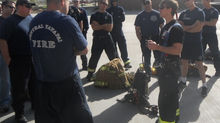Pay it Forward - Mentoring
- Brian Ward
- Feb 23, 2018
- 4 min read
Many people consider mentoring as a formal program that occurs in someone else’s department. Or, maybe there is one or two people in your life that gave you advice from time to time. However, I would argue that mentoring can be formal but the most powerful transformations are developed from informal mentoring. I have been fortunate to have surrounded myself, on purpose and by luck, with tremendous mentors in my life. It should not be good enough for any of us to just go home after every shift, however, to pay it forward so others can learn from your knowledge and skills – so the next generation goes home just the same.
The first mentor in my life was my dad, he punished me by splitting wood, learning construction, and teaching me to work with my hands. While I hated it growing up, now it aggravates my wife because I will not pay someone else to do what my father taught me. Little could I see what he was teaching me then would translate into a successful fire service career. Work ethic, leadership, working with my hands, running a chain saw before I could drive and so many other “chores” directly benefit me on every emergency scene. I’ll never forget the porch we built as a kid where he was not satisfied with post on the ground and a few nails in the boards. We built a 70’ x 15’ porch which a hurricane could withstand as I dug 3’ x 2’ holes pored with concrete for the 6” x 6” post and hurricane straps for the 4” x 6” rafters. He did not believe in half-way doing it, it had to be perfect.

As I joined my first volunteer department I was in the presence of personnel like Dave Minter, Ed Smith, and Karl Zimmer who expected me to attend every class I could. They said learn as much as you can and then teach us. Learn to apply what you were taught in the class on the fire ground. This was my first introduction to the fire service and the brotherhood. While it was luck to be in this situation, it was these brothers who mentored me on what good looks like. If you have never seen what good looks like, it is hard to measure up to it. They set the bar for my career.
While I was enjoying a great career with Gwinnett County Fire and Emergency Services, several personnel took the time to bring me along through mentoring. I was not the fastest or the smartest firefighter, I never achieved Top Rung or most fit, however, I would like to think they saw I had heart. I was going to give it everything and never give up. In my opinion, heart was the difference in me and other firefighters like me. There are way too many mentors to name here, however, in my book Barn Boss Leadership I discuss several examples of what veterans mean to the green-eared firefighter. During this same time, I also met a Battalion Chief from Atlanta (GA) who challenged me to complete the Georgia Smoke Divers Program. 12 months later I completed the program and he has been a mentor since that day, although he received no benefits from mentoring me. At that point I had no idea who he was, however, Chief David Rhodes (Fire Engineering Author, Speaker, UL Advisory Board, etc) is just that kind of brother. What if I would have never accepted his challenge?
As I have reached a turning point in my career, I have been given the amazing opportunity to mentor personnel. For me this is a huge responsibility, because I never want to fail them. It should be an honor for anyone in this position, but you shouldn’t wait for them to ask you. As a mentor in the fire service take the proactive approach to find those with heart and build them up with skills and knowledge. Here are a few ways:
Create opportunities
Encourage them to set goals beyond what they think is possible
Provide constructive feedback
Trust them with responsibilities
Let them lead
Don’t be afraid to let them fail
Broaden their horizons by showing them how it works outside of their bay walls.
Sitting at home one particular day, I started receiving a ton of text messages, one after the other of a fire that one of my firefighter brothers had been on. There were descriptions and pictures of how a smoke in the area call turned into a car fire, structure fire and then haz-mat call. Based strictly on the abnormality, I challenged him to write it up as a lessons learned article and we would submit it to Fire Engineering. Within three weeks Fire Engineering had received the article and accepted Gary’s first ever article. While Gary and I have never worked within an hour of each other we had trained at numerous events and developed a friendship. It was a proud moment for me to be able to stretch his capabilities and help him achieve a goal of his. Mentoring does not have to be just in your department or a formal program. It is part of the brotherhood and what all of us should be doing. We shouldn’t wait for them to come to us but we should reach out to them. It is never too late to share knowledge, teach a new skill or just ask how a brother is doing. Take care of those around you and they will take care of you.
Be Safe and Train Hard!
Brian










Comments